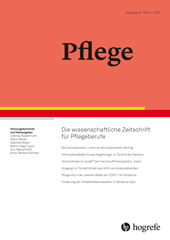Kinästhetikkompetenz in der spezialisierten Palliative Care
Prozessevaluation einer quasi-experimentellen Studie (AdKinPal)
Abstract
Zusammenfassung.Hintergrund: Palliative Situationen erfordern spezifische pflegerische Kompetenzen, um professionelle Symptomkontrolle zu gewährleisten. Das Schulungsprogramm „Advanced Kinaesthetics in Palliative Care“ (AdKinPal) soll die Kinästhetikkompetenz von Pflegenden im palliativen Setting fördern und so das Symptommanagement durch pflegerische Interventionen verbessern. Ziel: Der Beitrag zielt darauf ab, den Prozess der AdKinPal-Studie zu beleuchten, um die Machbarkeit des Programms zu überprüfen, mögliche Zielgrößen zu ermitteln und eine Revision des Programms für weitere Durchläufe zu ermöglichen. Methoden: Die Prozessevaluation erfolgte im Rahmen einer quasi-experimentellen Studie. Es fanden qualitative und quantitative Erhebungen statt (Interviews, Beobachtungsprotokolle, Fragebögen). Zur Auswertung dienten die qualitative Inhaltsanalyse und die deskriptive quantitative Analyse. Ergebnisse: Insgesamt bewerteten die Teilnehmenden die Workshops und Praxisbegleitungen als gewinnbringend. Jedoch zeigten sich auch hemmende Faktoren, beispielsweise der zeitliche und örtliche Rahmen oder die Gestaltung der Arbeitsunterlagen. Die Teilnehmenden stellen eine nachhaltige Kompetenzentwicklung in Frage. Schlussfolgerungen: Der erste Durchlauf des Schulungsprogramms verlief erfolgreich. Um zukünftig eine nachhaltige Kompetenzentwicklung sicherzustellen, sind Anpassungen notwendig.
Abstract.Background: To ensure professional symptom control in the context of palliative care, specific nursing skills are required. “Advanced Kinaesthetics in Palliative Care” (AdKinPal) is an education program intending to promote nurses’ kinaesthetics competence in order to improve symptom management by means of nursing interventions. Aim: The aim of this article is to illuminate the process of the AdKinPal study in order to check the program’s feasibility and to determine possible outcomes. Results may serve as a basis for revising the program with regard to further implementation. Methods: The process evaluation was part of a quasi-experimental study. We collected qualitative and quantitative data (interviews, observation protocols, questionnaire). For data interpretation, we used qualitative content analysis and descriptive quantitative analysis. Results: Overall, the participants valued the workshops and practical support as beneficial. Nevertheless, there were also inhibiting factors, such as workshop scheduling and location as well as working material. The participants questioned sustainable skills development. Conclusions: The first run of the education program was successful. To ensure sustainable competence development, adjustments are necessary for further implementation.
Literatur
(2018).
The role of Organizational Processes in Dissemination and Implementation Research . In R.C. BrownsonG.A. ColditzE.K. Proctor Eds., Dissemination and implementation research in health: Translating science to practice (2nd ed., pp. 121 – 142). New York: Oxford University Press.Bundesamt für Gesundheit (2020). Bessere Betreuung und Behandlung von Menschen am Lebensende: Bericht des Bundesrates in Erfüllung des Postulates 18.3384 der Kommission für soziale Sicherheit und Gesundheit des Ständerats (SGK-SR) vom 26. April 2018 . Bern. Verfügbar unter https://www.bag.admin.ch/dam/bag/de/dokumente/cc/bundesratsberichte/2020/bessere-betreuung-am-lebensende.pdf.download.pdf/200918_Bericht_Po_183384_Lebensende.pdf [01.03.2021].(2013). Developing and evaluating complex interventions: The new Medical Research Council guidance. International Journal of Nursing Studies , 50 (5), 587 – 592.
(2018). Mitarbeiter zum Lernen motivieren – mit Blended Learning. Pflegezeitschrift , 71 (12), 40 – 43.
(2009). Bewegungskompetenz auch im Sterbeprozess: Wie kann Kinaesthetics in der Palliativpflege angewendet werden? Lebensqualität , (4), 24 – 28.
(2012). Kinaesthetics in Palliative Care – Werkzeuge für mehr Lebensqualität und Autonomie: Erfahrungsberichte aus der gelebten Begleitung schwerstkranker Menschen . Bonn: PalliaMed-Verlag.
(1995). Wissenserwerb unter konstruktivistischer Perspektive. Zeitschrift Für Pädagogik , 41 (6), 867 – 888.
(2015). Strategies to promote coping and resilience in oncology and palliative care nurses caring for adult patients with malignancy: A comprehensive systematic review. JBI Database of Systematic Reviews and Implementation Reports , 13 (5), 131 – 204.
(2008). Symptom experience of dying long-term care residents. Journal of the American Geriatrics Society , 56 (1), 91 – 98.
(2016). Parihs revisited: From heuristic to integrated framework for the successful implementation of knowledge into practice. Implementation Science , 11 . https://doi.org/10.1186/s13012-016-0398-2
(2003). Kinästhetik: Gesundheitsentwicklung und menschliche Aktivitäten (2., komplett überarb. Aufl ) . München: Urban und Fischer.
(2016).
Einflussfaktoren in Implementierungsprozessen . In H.-W. Wahl M. Hoben M. Bär (Eds.), Implementierungswissenschaft für Pflege und Gerontologie: Grundlagen, Forschung und Anwendung – Ein Handbuch (1st ed., pp. 150 – 166). Stuttgart: W. Kohlhammer.(2015). Development and Psychometric Assessment of the Nursing Competence Self-Efficacy Scale. The Journal of Nursing Education , 54 (10), 550 – 558.
(2018). Qualitative Inhaltsanalyse. Methoden, Praxis, Computerunterstützung (4. Auflage). Weinheim, Basel: Beltz Juventa.
(2015). Practical strategies for nursing education program evaluation. Journal of Professional Nursing , 31 (2), 133 – 140.
(2019). Process evaluation in the field: Global learnings from seven implementation research hypertension projects in low-and middle-income countries. BMC Public Health , 19 (1), 953.
(2017). Anwendung und Chancen von Kinästhetik in der Palliative Care: eine qualitative Studie. palliative.ch. , (2), 40 – 44.
(2017). Anwendung und Chancen von Kinästhetik in der Palliative Care: eine qualitative Studie. palliative.ch. , (2), 40 – 44.
(2021). Fokus Pflegequalität: ein kompetenzorientiertes Qualitätsentwicklungssystem auf Basis der Kinästhetik. Pflegerecht . (1), 2 – 10.
(2014). Are there differences in the prevalence of palliative care-related problems in people living with advanced cancer and eight non-cancer conditions? A systematic review. Journal of Pain and Symptom Management , 48 (4), 660 – 677.
(2015). Process evaluation of complex interventions: Medical Research Council guidance. BMJ (Clinical Research Ed.) , 350 , h1258.
(2014). Lernen in realen Entscheidungssituationen. Kompetenzentwicklung ist mehr als Wissensvermittlung und Qualifkation: Führungskräfte tun dies am besten „on the job“ . Verfügbar unter https://www.business-wissen.de/artikel/kompetenzentwicklung-lernen-in-realen-entscheidungssituationen/ [01.03.2021].
(2012). Qualitative content analysis in practice (reprinted.). Los Angeles: SAGE.
(2014). Varianten qualitativer Inhaltsanalyse: Ein Wegweiser im Dickicht der Begrifflichkeiten . Verfügbar unter http://www.qualitative-research.net/index.php/fqs/article/viewFile/2043/3636 [01.03.2021].
(2016). Qualitative Inhaltsanalyse: Versuch einer Begriffsbestimmung und Systematisierung. Forum Qualitative Forschung , 17 (3).



